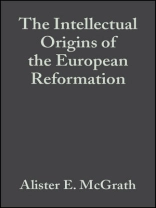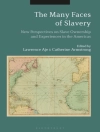The sixteenth-century Reformation remains a fascinating and exciting area of study. The revised edition of this distinguished volume explores the intellectual origins of the Reformation and examines the importance of ideas in the shaping of history.
- Provides an updated and expanded version of the original, highly-acclaimed edition.
- Explores the complex intellectual roots of the Reformation, offering a sustained engagement with the ideas of humanism and scholasticism.
- Demonstrates how the intellectual origins of the Reformation were heterogeneous, and examines the implications of this for our understanding of the Reformation as a whole.
- Offers a defence of the entire enterprise of intellectual history, and a reaffirmation of the importance of ideas to the development of history.
- Written by Alister E. Mc Grath, one of today’s best-known Christian writers.
表中的内容
Preface.
Abbreviations.
Introduction.
Part I: The Intellectual Context:.
1. The Shape of Late Medieval Religious Thought:.
The Rise of Lay Religion.
The Crisis of Authority within the Church.
The Development of Doctrinal Diversity.
Forerunners of the Reformation?.
2. Humanism and the Reformation:.
Humanism: The Problem of Definition.
Characteristic Features of Northern European Humanism.
Humanism and the Origins of the Reformed Church.
Humanism and the Origins of the Lutheran Church.
3. Late Medieval Theology and the Reformation:.
Nominalism: The Problem of Definition.
Via Moderna.
Schola Augustiniana Moderna.
Late Medieval Theology and the Origins of the Reformed Church.
Late Medieval Theology and the Origins of the Lutheran Church.
Part II: Sources and Methods:.
4. Scripture: Translation, Text and Tradition:.
The Medieval Consensus on the Theological Priority of Scripture.
The Vulgate Translation of the Bible.
The Humanist Return Ad Fontes.
The Critique of the Vulgate.
The Concept of Tradition.
The Principle Sola Scriptura.
5. The Interpretation of Scripture:.
Scholasticism: The Four-fold Sense of Scripture.
Humanism: The Letter and the Spirit.
Hermeneutics and the Origins of the Reformed Church.
Hermeneutics and the Origins of the Lutheran Church.
6. The Patristic Testimony:.
The Scholastic Reception of Augustine.
The Humanist Reception of Augustine.
The Patristic Testimony and the Origins of the Reformed Church.
The Patristic Testimony and the Origins of the Lutheran Church.
Conclusion: The Intellectual Heterogeneity of the Early Reformation.
Select Bibliography.
Index.
关于作者
Alister E. Mc Grath
is Professor of Historical Theology at Oxford University, and Principal of Wycliffe Hall, Oxford. He is the author of numerous bestselling books, including
The Future of Christianity,
Christian Theology: An Introduction, 3rd edition, and
In The Beginning: The Story of the King James Bible.












